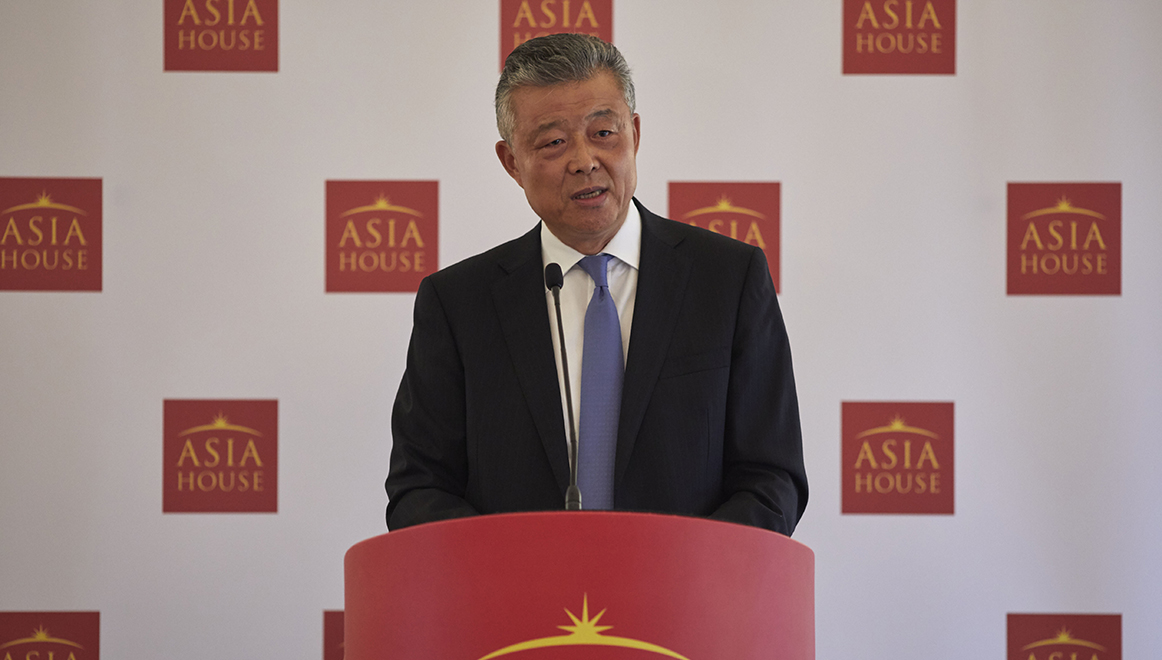Driving commercial and political engagement between Asia, the Middle East and Europe
Driving commercial and political engagement between Asia, the Middle East and Europe
Driving commercial and political engagement between Asia, the Middle East and Europe

“Stability and certainty have become scarce commodities” in the world today, according to the Chinese Ambassador to the UK.
Speaking to an audience of business and policy figures at Asia House, His Excellency Liu Xiaoming called for “badly needed” reform of the rules-based order, which he said is coming under increasing pressure.
“Surging protectionism and bullying behaviour are dealing a heavy blow to international rules and multilateral mechanisms, and undermining the trust and cooperation between countries of the world,” he said – comments which did not name, but clearly invoked, the US and the ongoing trade war.
The Ambassador was at Asia House to give a speech on the future of UK-China relations as the PRC approaches its 70th anniversary.
In a speech which ranged across several policy areas, the Ambassador set out China’s vision for protecting and improving the rules-based order in cooperation with the UK. But the Ambassador went beyond trade and economic affairs in his expansive remarks, even reflecting on China’s defence posture.
“Over the 70 years since the PLA was formed, China has never launched a single war or conflict,” he said, adding, “it is the only nuclear power in the world to have promised no first-use of nuclear weapons.”
The speech was followed by an audience Q&A, with questions ranging from China’s ambitions in Artificial Intelligence technologies to tourism, climate change and Brexit.
Mark Field, former UK Minister of State for Asia-Pacific, asked the Ambassador about the situation in Hong Kong, which remains gripped by ongoing protests and disruption.
“The One Country, Two Systems policy has achieved enormous success,” the Ambassador said. “It will be a guiding principle for Hong Kong in the future, in the days to come.”
However, he acknowledged that there are problems in Hong Kong, particularly because there is “not enough opportunities” for young people.
The Ambassador pointed to the Greater Bay Area strategy – Beijing’s ambitious plan to integrate key financial and tech sectors including Guangdong, Macau and Hong Kong – as a possible solution.
“I believe there are enormous opportunities for these areas to work together, and that there will be more opportunities for young people,” he said. “I hope young people in Hong Kong will seize these opportunities.”
But he was keen to remind the audience that there was no place for colonial reminiscence, in comments which invoked previous statements about ‘outside interference’ in the SAR.
“We hope that foreign countries will respect that Hong Kong is part of China, especially British politicians,” he said. “Do not regard Hong Kong as part of British colonial rule.”
Asked about Brexit, and how the political chaos in the UK is being perceived in China, the Ambassador said he hoped for a swift resolution.
“There are about 500 Chinese businesses operating in the UK. Some of them have their European headquarters in the UK. They have reason to be concerned about the prospect of Brexit, about a deal or no deal.”
“We’d like to have more certainty,” he said.
Some of the themes covered by the Ambassador will be explored during Asia House’s major trade dialogue in Hong Kong on 30 October. Find out more
WATCH the speech and Q&A in full
